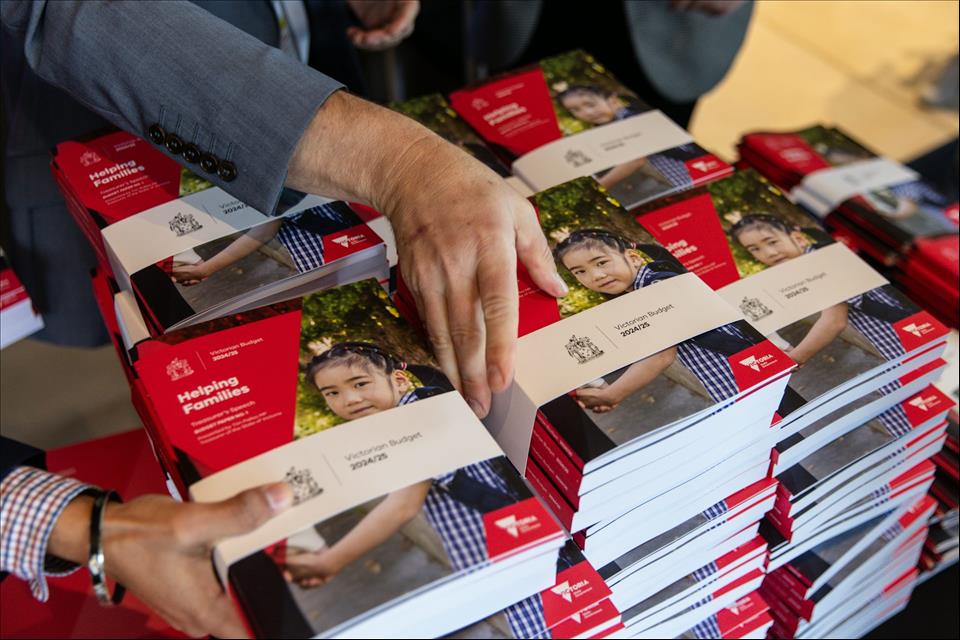
'Eye Watering' Spending, Growing Debt Make Up Surprisingly Generous Victorian State Budget
But that was not to be, for the government – which has the largest debt of all the states and territories at A$156 billion – has kept its fiscal juices flowing.
State coffers have swelled beyond the budget estimates last year by $4.2 billion, but instead of banking the revenue surge, the government has chosen to keep spending.
Cash splashSix billion dollars of new initiatives were announced for 2024-25, or about $3 billion net of savings. New capital spending initiatives next year are also healthy, at more than $2 billion, and infrastructure spending in total will exceed $23 billion.
The government is not relying on the federal government for extra financial support. But a big chunk of Budget Paper Number 4 link sets out in some detail why it reckons it has a strong case for more federal dollars, pointing to a string of consecutive years when its share of federal capital grants and the GST has been less than its share of the national population.
That argument is likely to fall on deaf ears, no matter how well it has been made.
As the table below shows, the underlying budget position has been allowed to loosen by comparison with last year's budget and the budget update delivered last December.
All that extra spending will see the budget remain in slightly larger deficit next year and government net debt will continue to rise faster than was budgeted.
The government might have been expected to reduce spending to reduce inflationary pressures, especially now interest rates are high. So its approach is surprising, even for a government as committed to Keynesian principles as Victoria.
Keynesian economics is based on the idea strong economies spend or invest more than they save. Even if this means going into debt, it creates jobs and boosts consumer buying power.
But it is not as if the economy needs more stimulus.
The budget papers show the state's economy has well and truly bounced back from the dark days of the COVID lockdowns. Victoria has done this so well it has led the country over the last 12 months in employment and economic growth.
Instead of mass unemployment, the opposite is happening with the unemployment rate in Melbourne and the rest of the state near record lows.
As the budget papers put it:
The labour market is so strong,“key parts of the economy [are now] facing labour shortages”.
Sticking to a planThe Treasurer Tim Pallas might defend his loose fiscal settings by saying, why change when they have worked to date?
His plan will see the budget back in an operating surplus in 2025-26 and it is tipped to stay that way for the foreseeable future. He might point to his forecasts showing unemployment to rise to 4.7% over the next few years. He wants to keep the fiscal tap open to prevent unemployment getting worse.
The problem with this is it sits uncomfortably next to the settings put in place by the Reserve Bank, which rightly or wrongly has inflation as its number one target.
There are a lot of voices urging the bank to pull the interest rate trigger one more time to get inflation under control, and loose fiscal settings will only help their cause.
When the Victorian government and the Reserve Bank have been at odds in the past, it has not ended well for Victoria.
Pallas might also be reminded things have changed. The economy has bounced back better than expected. Revenues have been pouring in. His very successes to date are the very reason why a new approach was needed.
And where better to start than with capital spending.
Potential savingsPallas could have slowed the rate of growth. Nothing had to be cancelled. New measures that were to be announced might have been delayed another year. Yes, the airport rail link has been delayed by four years, but that reflects the squabble going on between the government and the airport over where the station should be built and at whose expense, rather than a commitment to budget austerity.
The budget delivers another eye watering set of initiatives, across a wide range of portfolios.
Hospitals have been given an extra $1.8 billion in the budget. David Mariuz/AAP
There's $287 million for families with children in government and low income private schools to help cover the cost of things like uniforms, $473 million for 16 new schools, $1.8 billion for hospitals, $100 million to kick start new hospital construction, $131 million for free TAFE, $58 million to remove unsafe cladding, $75 million to get the metro tunnel ready to open, $105 million extra for road maintenance, and $700 million to expand the government's Homebuyer Fund.
In the media lockup, Pallas argued to a sea of unconvinced reporters the budget involves a significant amount of tightening. He pointed as evidence to slightly lower forecast deficits in 2026-27 and 2027-28 and a lower level of infrastructure spending during those years.
But that is in the legendary“outyears”, which fortunately for treasurers never arrive.
The government's generosity will go down well with an electorate feeling the pinch of a cost of living crunch.
But should the Reserve Bank crank up interest rates and tip the economy into recession, partly because of excessive government spending,the politics might turn out very different.
The Victorian budget is no longer shrink-wrapped. Its rather dangerously exposed to inclement economic weather.

Legal Disclaimer:
MENAFN provides the
information “as is” without warranty of any kind. We do not accept
any responsibility or liability for the accuracy, content, images,
videos, licenses, completeness, legality, or reliability of the information
contained in this article. If you have any complaints or copyright
issues related to this article, kindly contact the provider above.

















Comments
No comment